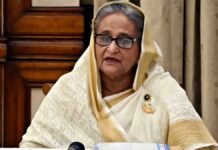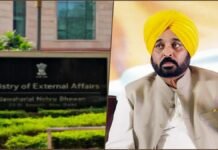
Key Points
- India acknowledged Sheikh Hasina verdict on November 17, emphasizing commitment to Bangladesh’s best interests and regional stability
- MEA stated India will engage constructively with all stakeholders, prioritizing peace, democracy, inclusiveness, and stability in Bangladesh
- Bangladesh formally renewed extradition request after death sentence, with Law Adviser Asif Nazrul warning continued shelter would be “act of hostility”
- India-Bangladesh extradition treaty signed in 2013 allows refusal if offense deemed “politically motivated,” term Hasina has used to reject charges
- Hasina has been living in India since August 5, 2024, when she fled Bangladesh amid massive student-led protests that toppled her government
- Experts believe India unlikely to extradite Hasina due to diplomatic considerations and concerns about fair trial in Bangladesh
New Delhi: The Ministry of External Affairs issued a carefully calibrated statement on Monday, November 17, 2025, responding to the death sentence handed down to Sheikh Hasina by Bangladesh’s International Crimes Tribunal. The MEA’s brief statement read: “India has noted the verdict announced by the ‘International Crimes Tribunal of Bangladesh’ concerning former prime minister Sheikh Hasina”. The use of quotation marks around the tribunal’s name in India’s official statement was notable, potentially signaling reservations about the body’s legitimacy or independence.
The statement continued: “As a close neighbor, we remain committed to the best interests of the people of Bangladesh. Maintaining peace, democracy, inclusiveness, and stability in Bangladesh is of utmost importance”. India pledged to “engage constructively with all stakeholders” in Bangladesh, using diplomatic language that carefully avoided taking a position on the verdict itself while emphasizing broader regional stability concerns. The measured response reflects India’s delicate balancing act between humanitarian considerations for Hasina, who has been living in the country since August 2024, and maintaining workable relations with Bangladesh’s interim government.
Tribunal Convicted Hasina On Three Counts
The International Crimes Tribunal-Bangladesh sentenced Sheikh Hasina to death after finding her guilty on three of five counts related to the July-August 2024 uprising. The 78-year-old former prime minister was convicted in absentia after defying court orders to return from India to attend her trial. The tribunal, during a hearing in a heavily guarded courtroom in Dhaka, ruled that the prosecution had proven beyond a reasonable doubt that Hasina was behind the deadly crackdown on student-led protests from July 15 to August 5, 2024.
The court found that Hasina ordered the use of lethal force, drones, and helicopters against unarmed protesters, made inflammatory statements, and authorized a systematic campaign to kill students in Dhaka and surrounding areas. According to a United Nations Human Rights Office report, approximately 1,400 people were killed during the July uprising, with thousands more injured and arrested. Former Home Minister Asaduzzaman Khan Kamal also received the death penalty, while former police chief Chowdhury Abdullah Al-Mamun was sentenced to five years after turning state witness.
Bangladesh Renews Extradition Demands
Hours after the death sentence was pronounced, Bangladesh’s interim government formally renewed its demand for Sheikh Hasina’s extradition from India. Law, Justice, and Parliamentary Affairs Adviser Asif Nazrul announced that the government would write another formal letter to India seeking Hasina’s return to face justice. “We will write a letter to India again to extradite Sheikh Hasina. If India continues to shelter this mass murderer, then India must understand that this is an act of hostility against Bangladesh and the people of Bangladesh,” Nazrul stated in strong language.
Nazrul expressed satisfaction with the tribunal’s verdict, calling it “a historic day for Bangladesh” and “the finest achievement in the establishment of justice” on Bangladeshi soil. Press Secretary to Chief Adviser Muhammad Yunus, Shafiqul Alam, echoed these sentiments, stating: “We now urge the Republic of India to act with conscience and moral clarity. For too long, India has refused to comply with Bangladesh’s lawful request for the extradition of Sheikh Hasina”. The harsh rhetoric marks an escalation in the diplomatic standoff between the two neighbors over Hasina’s fate.
Previous Extradition Request In December 2024
Bangladesh first submitted a formal extradition request to India in December 2024, two weeks after India’s Foreign Secretary visited Bangladesh, and both countries expressed hope for constructive relations. Foreign Affairs Advisor Md Touhid Hossain confirmed at the time: “We sent a note verbale to the Indian government saying that the Bangladesh government wants [Hasina] back here for judicial process”. India acknowledged receiving the Note Verbale through its Ministry of External Affairs but offered no comment on its next course of action.
In July 2025, Bangladesh’s interim government formally began renewed efforts to secure Hasina’s extradition, with Hossain stating: “We have sent a letter. We will follow up if necessary”. The extradition demand became a recurring theme in bilateral discussions, with Chief Adviser Muhammad Yunus raising the issue with Prime Minister Narendra Modi during a meeting on the sidelines of the BIMSTEC Summit in Bangkok in April 2025, where he indicated India should ask Hasina to stop criticizing his government.
Extradition Treaty Provides Legal Grounds For Refusal
India and Bangladesh signed a bilateral extradition treaty in January 2013 when Sheikh Hasina was in power, establishing legal parameters for such requests. Critically, the treaty clearly states that an extradition request may be rejected if the offense is deemed to be of a “political nature,” precisely the term Hasina has been using to characterize all charges against her. The treaty contains several provisions allowing India to refuse extradition.
Grounds for refusal under the treaty include: extradition may be refused if the offense is of a political nature; accusations not made “in good faith in the interests of justice”; and military offenses not considered general criminal law violations. However, the treaty also specifies that some crimes, including murder, enforced disappearance, and torture, are excluded from being categorized as political offenses, potentially complicating the political offense defense. India’s legal review will need to balance these competing provisions while considering whether the tribunal’s proceedings met international standards of fairness and due process.
Hasina’s Status In India Remains Ambiguous
Sheikh Hasina arrived in India on August 5, 2024, on very short notice as massive student-led protests forced the collapse of her government. External Affairs Minister S. Jaishankar stated at the time that Hasina had sought approval from Prime Minister Narendra Modi’s government to come to India “for the moment,” with speculation suggesting she would leave after a “brief stay”. However, over a year later, Hasina continues to reside in India with no official word on whether or when she has any plans to leave.
India has not publicly disclosed Hasina’s precise legal status in the country, whether she is considered a guest of the government, has been granted any form of asylum, or holds a specific visa category. Her continued presence in India reflects the country’s traditional policy of providing safe haven to political leaders from neighboring countries facing domestic turmoil, a practice dating back decades that has included figures from various South Asian nations. However, this policy creates diplomatic complications when host countries demand the return of individuals India is sheltering.
Expert Assessment: Extradition Unlikely
Legal and diplomatic experts analyzing the situation believe India is highly unlikely to extradite Sheikh Hasina to Bangladesh despite the formal requests and escalating rhetoric from Dhaka. Professor Sreeradha Datta, a South Asian Studies specialist at Jindal Global University, told Al Jazeera: “Under no circumstances is India going to extradite her. We saw in the last year and a half that relationships between India and Bangladesh are not at their best, and have been fragile on many occasions”.
India’s decision-making will be influenced by multiple factors beyond the strict legal provisions of the extradition treaty. New Delhi will assess whether the tribunal’s verdict reflects a bona fide, impartial judicial process, or whether returning a former head of government would expose her to mistreatment, an unfair trial, or other human rights violations. Widely reported incidents of violence and humiliation in and around Bangladeshi courts, such as the assault on former Education Minister Deepu Moni and the public mistreatment of Industrial Advisor Salman F. Rehman, provide evidence suggesting high-profile defendants may not receive adequate legal protection.
India’s Diplomatic Options
India faces a spectrum of strategic choices in responding to Bangladesh’s extradition demand. The government can accept the request and proceed with extradition if satisfied the judicial process in Bangladesh meets accepted international standards of fairness and due process. Alternatively, India can refuse on legal grounds, citing reasonable fears of persecution, denial of fair trial rights, or the political nature of the charges under the bilateral treaty.
A third option involves delaying a decision while seeking diplomatic assurances from Dhaka about fair treatment, physical security, adherence to international legal norms, and guarantees against cruel, inhuman, or degrading treatment. India could also request that Bangladesh provide specific commitments regarding Hasina’s right to appeal, access to competent legal representation, and humane detention conditions. The most likely scenario, according to diplomatic observers, is that India will continue its policy of studied ambiguity, neither granting nor explicitly refusing the extradition request while maintaining that the matter is under review.
Bilateral Relations Remain Strained
The Hasina extradition issue has become a central irritant in India-Bangladesh relations, which have experienced significant strain since the interim government led by Muhammad Yunus took power in August 2024. The relationship has been tested by multiple issues including treatment of Hindu minorities in Bangladesh, border management, water sharing agreements, and trade imbalances. India’s sheltering of Hasina adds another layer of complexity to already fragile bilateral ties.
Despite these tensions, both countries recognize the importance of maintaining functional diplomatic and economic relations given their geographic proximity, shared history, and extensive people-to-people connections. India’s statement emphasizing its commitment to Bangladesh’s stability and pledging constructive engagement with all stakeholders represents an effort to prevent the Hasina issue from completely derailing the broader relationship. However, the harsh language from Bangladeshi officials characterizing continued Indian shelter as an “act of hostility” suggests that this issue will remain a major obstacle to normalized relations for the foreseeable future.
Hasina’s Immediate Fate Rests With India
For Sheikh Hasina, the next chapter hinges almost entirely on New Delhi’s response to Bangladesh’s renewed extradition demand. Her immediate fate rests with a careful, politically fraught review in India that must balance humanitarian considerations, legal obligations under the extradition treaty, concerns about judicial fairness in Bangladesh, and the broader implications for India’s regional diplomacy. Hasina herself has publicly rejected the tribunal’s verdict, calling it “biased and politically motivated,” and has dismissed all allegations against her as baseless.
The death sentence, while symbolically significant for Bangladesh’s interim government and the victims’ families seeking accountability, cannot be executed while Hasina remains beyond the tribunal’s physical reach in India. Whether she ever faces justice in Bangladesh depends entirely on India’s next move, a decision that will reverberate far beyond bilateral relations to shape perceptions of India’s role as a regional power and its commitment to principles of justice, human rights, and international legal cooperation.






















































